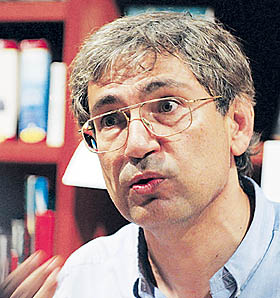Nobelprijs voor Literatuur 2014 voor Patrick Modiano
De Nobelprijs voor Literatuur is dit jaar toegekend aan de Franse schrijver Patrick Modiano. Patrick Modiano werd geboren in Boulogne-Billancourt op 30 juli 1945. Zie ook alle tags voor Patrick Mondiano op dit blog.
Uit: Dora Bruder
“C’était en février, pensais-je, qu’ “ils” avaient dû la prendre dans leurs filets. “Ils”: cela pouvait être aussi bien de simples gardiens de la paix que les inspecteurs de la Brigade des mineurs ou de la Police des questions juives faisant un contrôle d’identité dans un lieu public… J’avais lu dans un livre de Mémoires que des filles de dix-huit ou dix-neuf ans avaient été envoyées aux Tourelles pour de légères infractions aux “ordonnances allemandes”, et même, quelques-unes avaient seize ans, l’âge de Dora… Ce mois de février, le soir de l’entrée en vigueur de l’ordonnance allemande, mon père avait été pris dans une rafle, aux Champs-Elysées. Des inspecteurs de la Police des questions juives avaient bloqué les accès d’un restaurant de la rue de Marignan où il dînait avec une amie. Ils avaient demandé leurs papiers à tous les clients. Mon père n’en avait pas sur lui. Ils l’avaient embarqué. Dans le panier à salade qui l’emmenait des Champs-Elysées à la rue Greffulhe, siège de la Police des questions juives, il avait remarqué, parmi d’autres ombres, une jeune fille d’environ dix-huit ans. Il l’avait perdue de vue quand on les avait fait monter à l’étage de l’immeuble qu’occupaient cette officine de police et le bureau de son chef, un certain commissaire Schweblin. Puis il avait réussi à s’enfuir, profitant d’une minuterie éteinte, au moment où il redescendait l’escalier et où il allait être mené au Dépôt. Mon père avait fait à peine mention de cette jeune fille lorsqu’il m’avait raconté sa mésaventure pour la première et la dernière fois de sa vie, un soir de juin 1963 où nous étions dans un restaurant des Champs-Elysées, presque en face de celui où il avait été appréhendé vingt ans auparavant. Il ne m’avait donné aucun détail sur son physique, sur ses vêtements. Je l’avais presque oubliée, jusqu’au jour où j’ai appris l’existence de Dora Bruder. Alors, la présence de cette jeune fille dans le panier à salade avec mon père et d’autres inconnus, cette nuit de février, m’est remontée à la mémoire et bientôt je me suis demandé si elle n’était pas Dora Bruder, que l’on venait d’arrêter elle aussi, avant de l’envoyer aux Tourelles.
Peut-être ai-je voulu qu’ils se croisent, mon père et elle, en cet hiver 1942. Si différents qu’ils aient été, l’un et l’autre, on les avait classés, cet hiver-là, dans la même catégorie de réprouvés. Mon père non plus ne s’était pas fait recenser en octobre 1940 et, comme Dora Bruder, il ne portait pas de numéro de “dossier juif”. Ainsi n’avait-il plus aucune existence légale et avait-il coupé toutes les amarres avec un monde où il fallait que chacun justifie d’un métier, d’une famille, d’une nationalité, d’une date de naissance, d’un domicile. Désormais il était ailleurs. Un peu comme Dora après sa fugue. »

Patrick Modiano (Boulogne-Billancourt, 30 juli 1945)








